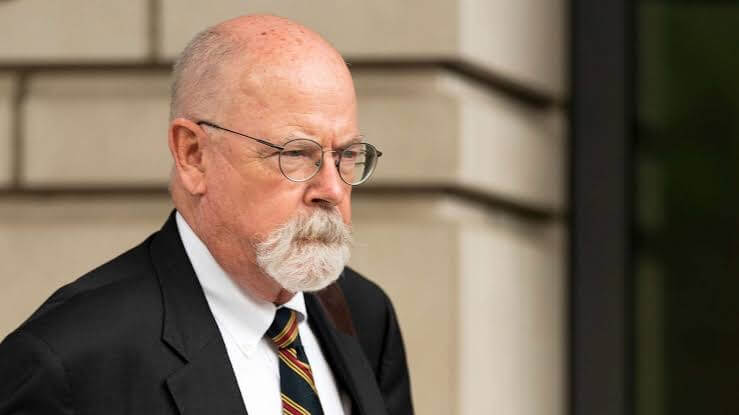Special counsel John Durham’s much-awaited, more than 300-page long report, which was released on Monday, sharply criticises the FBI’s investigation of the 2016 Trump campaign as using “raw, unanalysed, and uncorroborated intelligence” — an outcome that may exacerbate extant partisan debate about the politicisation of the Justice Department (DoJ) and the FBI.
Durham probed the origin of the FBI’s “Crossfire Hurricane” investigation on connections between Russian officials and Donald Trump’s 2016 presidential campaign for four years.
Key Findings
In the report’s introduction, Durham addressed Republicans’ dissatisfaction that he could not get substantial criminal charges for alleged FBI misconduct in the Trump-Russia inquiry. “[N]ot every injustice or transgression amounts to a criminal offence,” he wrote.
Durham stated that the law does not prohibit “all unseemly or unethical conduct that political campaigns might undertake for tactical advantage,” and that prosecutors must prove criminal intent to achieve convictions. This final remark appears to relate to the numerous claims levelled by Republicans against Hillary Clinton’s 2016 campaign and her outside allies.
Compared to other potentially sensitive investigations, such as those involving his 2016 electoral rival Hillary Clinton, the report noted significant differences in how the FBI handled the Trump investigation.
The special counsel stated, “Comparing the respective investigative activity was significant to the investigation since it could support or undercut allegations of institutional bias against either candidate.”
The Durham Report has dropped and the report concludes that the FBI never should have launched the Trump-Russia probe in the first place. The report EXONERATES Donald Trump once and for all. The American people were scammed by an FBI/DOJ that has been weaponized against… pic.twitter.com/LMhNjXm0VC
— Charlie Kirk (@charliekirk11) May 15, 2023
The report also pointed out that, while the FBI warned the Clinton campaign when they observed potential evidence used by a foreign power to influence her, they did not do the same for the Trump campaign before promptly initiating an investigation. “The Department [of Justice] and the FBI failed to uphold their important mission of strict fidelity to the law,” it underlined.
Durham asserted that he is not proposing “any wholesale changes” to the policies of the FBI or DoJ. “The answer is not the creation of new rules, but a renewed fidelity to the old.” All the same, the report closes with a 17-page conversation of how politically sensitive investigations ought to or could be taken care of distinctively from here on out.
He concluded that US intelligence and law enforcement had no “actual evidence” of cooperation between Trump’s campaign and Russia before the commencement of Crossfire Hurricane.
In one of Durham’s interviews, the US intelligence community was made aware of Russian intelligence assessments during the 2016 campaign, which claimed that Clinton’s campaign intended to create controversy around Trump’s links to Russia to divert attention away from her email server issues.
The unproven Russian claim was previously disclosed, but dismissed by the Democrats as disinformation from a foreign adversary aiming to influence the election. Durham said that most of the Crossfire Hurricane personnel he talked about had yet to see it, including the investigation’s original supervising special agent.
THE DEEP STATE LIED: Durham Report Destroys ANY INKLING of Trump-Russia Collusion – Strzok Knew NO ONE in Trump Camp Contacted Russia, Blows His Court Case Out of the Water via @gatewaypundit https://t.co/N496CUhK9M
— The Gateway Pundit (@gatewaypundit) May 15, 2023
FBI’s Response
In a statement, the FBI stated that it had “already implemented dozens of corrective actions.” “Had those reforms been in place in 2016, the missteps identified in the report could have been prevented,” the statement added.
Much of the FBI behaviour outlined in the report was previously acknowledged and condemned in a 2019 investigation by the DoJ’s inspector general, who found no “documentary or testimonial evidence of intentional misconduct.”
Durham’s investigation dealt another significant setback just a few months later, when a Virginia jury cleared Russian specialist Igor Danchenko of charges that he deceived the FBI when he was consulted about the source of information he gave, which turned out to be essential for a report known as the “Steele dossier.”
Later, the DoJ inspector general found that the FBI improperly relied on unsubstantiated allegations in the Steele dossier when it applied for court-approved warrants to monitor the communications of Carter Page, a former Trump campaign adviser.
Durham secured a guilty plea against previous FBI lawyer Kevin Clinesmith, who was singled out in the inspector general’s report for changing an email used to legitimise an administration wiretap application for Page.
Overall, the report also reiterated many of the earlier concerns expressed by the inspector general about the integrity of the FBI’s procedure for filing to the Foreign Intelligence Surveillance Court for wiretap applications.

